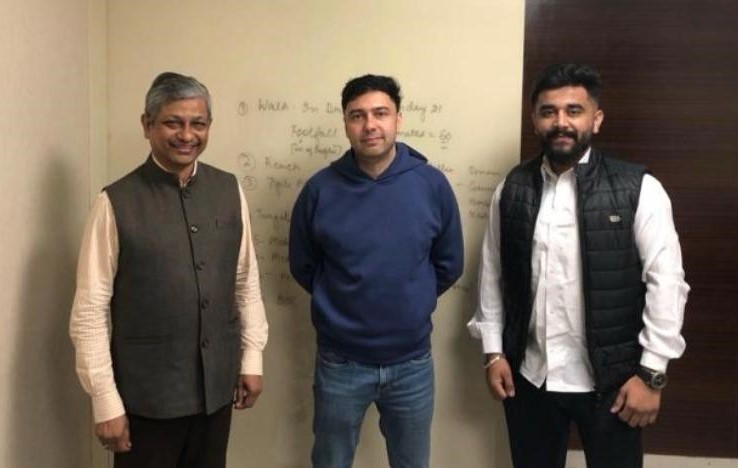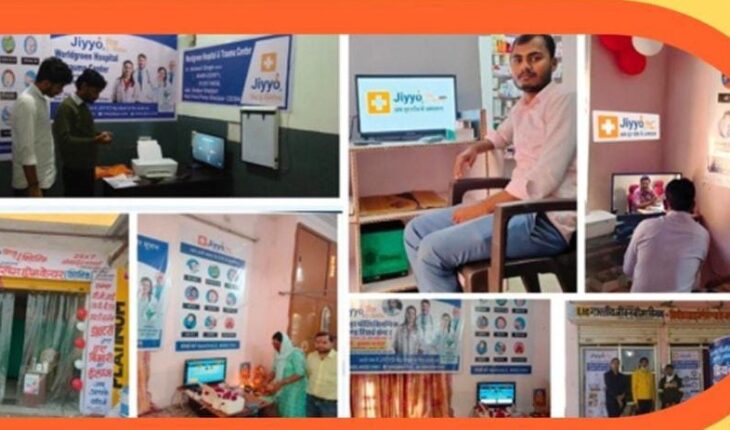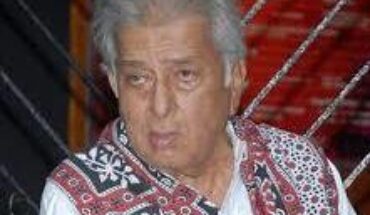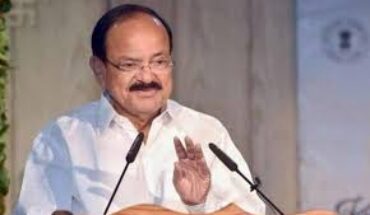Siddharth Angrish, CEO & Founder, Jiyyo Innovations, an alumni of IIT Roorkee in an interaction with FW

Dr. Keerti Bhusan Pradhan (Advisor, Jiyyo Innovations), Siddharth Angrish (CEO and Founder, Jiyyo) and Sachin Jangra (Manager, Operations) (L to R)
What is Last Mile Healthcare?
Making good quality healthcare accessible to every household across every district through pre-existing, locally accepted formats is the goal of last mile healthcare. While major Indian cities have remarkable healthcare institutions, it is not easy for most out-of-city patients to travel and optimally access them. An average patient needs lots of guidance on when to take symptoms seriously, which doctor to see, how to take symptoms seriously, adhering to treatment protocol, follow-ups and when/whether to opt for a surgery. It is in the best interest of a patient if they get all this guidance at the place of their residence. The need to regularly venture out to different cities to get good advice and treatment may force a patient or its family to settle for less optimal options. Last mile healthcare strives to improve primary healthcare in a scalable manner which any household can access within 2-5 km of their residence.
What opportunities does it present?
India has more than 1 million small private healthcare providers which geographically cover each village, town and corner of every city. Each such practitioner has easy access to 150-400 nearby households. This dense network encompasses almost the entire 24M+ households of India. Most of such providers are pharmacists, AYUSH practitioners, lab technicians and experienced nurses. They are in regular need to be in touch with qualified city-based doctors for those of their patients who are not getting relief from locally available treatment and may need to travel to cities. In our experience, the daily traffic at each such small provider ranges between 5-20 patients and at least 5% of them need consultation from city based qualified doctors. This amounts to almost 500K daily patients. Serving 500K patients remotely without them needing to travel far from their home has tremendous socio-economic benefits. Typically, such a patient’s prescription cost is around INR 1000 which includes cost of consultation fee and prescribed medicines and tests. A rough calculation indicates a daily economic potential of INR 50 Cr (annual. 15,000+ Cr) without including surgical, procedural interventions.
What are unique challenges in Last Mile Healthcare delivery?
Primary care is a significant component of last mile healthcare. Frequently, primary care is considered less interesting by several health industry stakeholders. So far, major healthcare investments have been into city hospitals, pathology labs and online pharmacies. All three of them are city focussed. This has created a very unbalanced healthcare system in India, where on one hand thousands of hospitals and pathology labs compete with each other in cities while the rural and semi-urban sector remains largely untouched. Secondly, a completely online healthcare solution remains insufficient in handling needs for a typical last mile patient since medicines and lab tests are needed in real time after an e-consultation. Lastly, setting up independent small health centers in villages has its own challenges of economic viability, handling pilferages and higher management costs. However, Software as a Service (SaaS) based asset light model to upgrade tens of thousands of existing independent primary care providers, offers the best of all worlds. That is why Jiyyo has found traction in 200+ districts by setting up more than 1,500 franchisees and operating profitably at the same time.
What is the role of technology in this domain ?
Technology plays a pivotal role in improving the last mile healthcare by making the best doctors available at each primary care provider in an easy, predictable and affordable manner. Technology can bridge the gap between a care provider operating at the last mile and a city based specialist by integrating useful medical devices, tracking treatment and follow-up of patients. The ability of tens of thousands of small care providers to accurately triage patients can increase manifolds by proper usage of tele-medicine solutions. Triage here refers to the preliminary assessment of patients or casualties in order to determine the urgency of their need for treatment and the nature of treatment required.
Does AI have a role here?
When last mile care providers latch onto newer technologies to better handle their patients, connect with specialists, lots of useful medical data would get recorded. This can be harnessed to more accurately understand patient symptoms, predict more accurate treatment trajectory and increase diagnosis accuracy. For example, we see about 4GB of data generated daily by our users. With more e-Clinics being added every month, and more diagnostics features and products over time, we foresee the daily data generation to top 1+TB a day within the next 12 months.
What impact has already been achieved in last mile healthcare?
Jiyyo has been able to set up more than 1,500 last mile healthcare centers in 200+ districts of 11 states in India. More than 400K patients have taken e-consultations from these centers with over 39% patient repeat rates. These centers have been established in existing pharmacies and clinics run by primary care providers. Jiyyo has been able to help the last mile patient save more than 100 crore rupees in travel savings and optimal treatment plans. Jiyyo’s eClinic operators have added more than 40 crore rupees to their earnings.
Jiyyo Mitra E-Clinics:-
- 200+ districts of 11 States in India
- More than 400K patients took e-consultations
- 39% Repeat Rates
- Last Mile Patient savings of more than Rs. 100 Cr.
- Added earnings for Jiyyo’s eClinic Operators: >Rs. 40 Cr.
Interesting case studies
A patient from a village in Rohtas, Bihar has been visiting a Jiyyo e-Clinic in his own village and taking consultations from a psychiatrist on Jiyyo’s platform for the past 2 years. When the treatment began in April 2022, the patient had severe psychosis: fearfulness, irritability and insomnia. The patient responded well to the treatment prescribed remotely by the doctor. He made 20 visits over the next 2 years and has been maintaining well for the past several months.
There is another case of a 75 year old patient from Bijnor, Uttar Pradesh, who was unable to speak and remember things, including names of her own family members. She visited a nearby Jiyyo e-Clinic and consulted a neurologist. Over the next 6 weeks, she improved remarkably and is leading a much happier life. These are just two stories out of tens of thousands where patients with severe chronic ailments are affordably getting relief without stepping out of their village or town.
Thoughts on the future?
Improving last mile healthcare is the next billion dollar prize in the health industry. As more primary care providers adopt such easy to use, affordable solutions, the healthcare index of the rural and semi-urban regions will improve significantly reducing unnecessary patient travel and adding to their savings and healthy years. Since technology is the basis of last mile healthcare, lots of interesting data like patient history, symptoms, response to treatment methodologies gets recorded. This massive data, which hitherto is not recorded at all, will help unlock the next innovations in healthcare.






